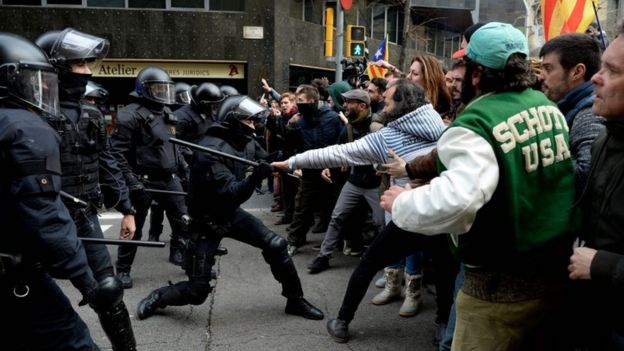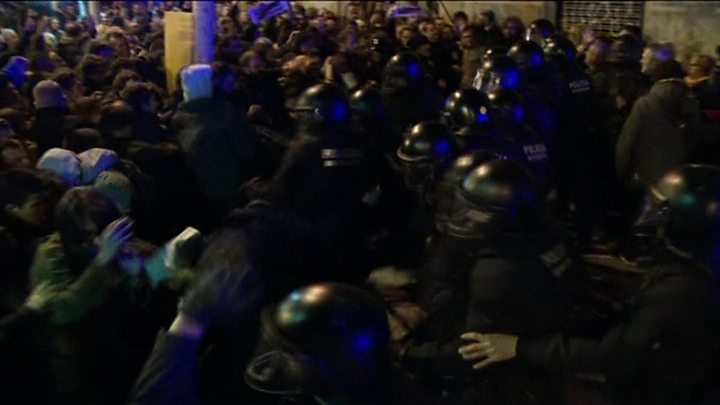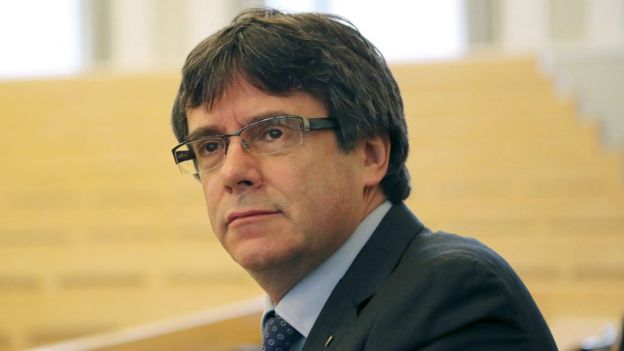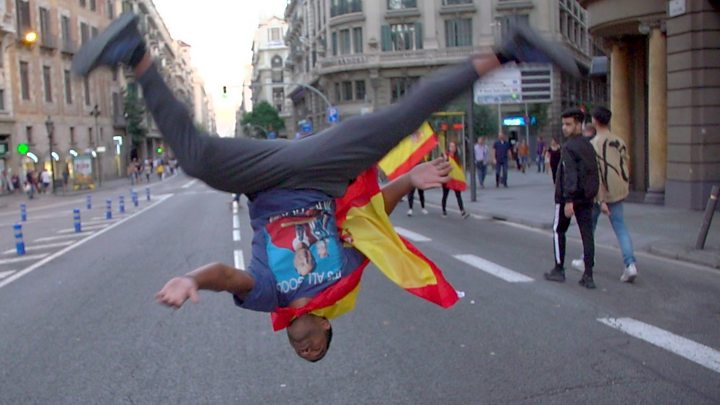Catalonia's ex-leader Carles Puigdemont has been detained by German police acting on a European arrest warrant.
Mr Puigdemont, who is wanted in Spain for sedition and rebellion, was held crossing from Denmark on the way to Belgium, his lawyer said.
Mr Puigdemont will appear before a German judge on Monday.
The ex-leader's supporters gathered in Barcelona to protest against his arrest. The charges he faces in Spain could result in 30 years in prison.
Mr Puigdemont has been living in self-imposed exile in Belgium since Catalonia's parliament unilaterally declared independence from Spain in October.
He was visiting Finland last week when the arrest warrant against him was reissued, and he slipped out of the country on Friday before Finnish authorities could arrest him.
He is spending the night in a prison in the north German town of Neumuenster.
His court appearance on Monday will be a formality to confirm his identity. Afterwards a decision will be made about whether he will remain in custody while the extradition order is being processed.
German police said that Mr Puigdemont was detained by a highway patrol in the northern state of Schleswig-Holstein, which borders Denmark.
After the news of his arrest broke on Sunday, thousands of demonstrators poured on to the streets of Barcelona.
 Image copyrightAFP
Image copyrightAFP
They chanted "Freedom for the political prisoners" and "This Europe is shameful!" as they headed to the offices of the European Commission and the German consulate.
A smaller protest was held in Girona, where Mr Puigdemont once served as mayor.
Tensions in Catalonia are very high and its separatist leaders abandoned plans to name a new president following the arrest of the latest candidate, Jordi Turull, on Friday.
Protesters clashed with police in Barcelona on Friday night after Spain's Supreme Court ruled 25 Catalan leaders should be tried for rebellion, embezzlement or disobeying the state. Mr Turull was among five people taken into custody in fresh arrests.
The rulings were considered the most serious challenge to date to the Catalan independence movement. Almost the entire leadership now faces a major legal fight.

Following the referendum, the central government in Madrid sacked the Catalan regional government, imposed direct rule and called new elections but pro-independence parties returned with a slim majority.
International warrants for Mr Puigdemont and other Catalan leaders were withdrawn in December by a Spanish judge, who said they had shown a willingness to return to the country.
The warrants were reissued on Friday, surprising Mr Puigdemont, who had been in Finland to give a university lecture.
Among those also wanted is Catalonia's former education minister, Clara Ponsati. She is in Scotland, where she has a position at the University of St Andrews, and says she is willing to hand herself in.
Who is Carles Puigdemont?
 Image copyrightEPA
Image copyrightEPACarles Puigdemont, 55, is a former journalist who worked for pro-independence media in Catalonia and headed the Catalan News Agency.
After moving to politics, he became an MP and later mayor of Girona, north-east of Barcelona.
In 2016, he became leader of Catalonia and led the region to the referendum the following year.
During his self-imposed exile following the resulting crisis, Mr Puigdemont told Belgian TV he was not hiding from "real justice" but from the "clearly politicised" Spanish legal system.
How we got here

27 October: Catalonia's leaders declare independence, which leads to the Spanish government imposing direct rule on the region and dissolving its parliament
30 October: Charges of rebellion, sedition and misuse of public funds are brought against various sacked members of the Catalan government, including Mr Puigdemont
2 November: Several former Catalan ministers are taken into custody in Spain
3 November: European Arrest Warrants are issued against Mr Puigdemont and four of his allies, who have all fled to Belgium
5 December: A Spanish judge withdraws the European arrest warrants but says the group still face possible charges for sedition and rebellion
21 December: Carles Puigdemont is re-elected to parliament during Catalan's regional elections - which Spanish PM Mariano Rajoy had called to "restore democracy"
1 March 2018: Mr Puigdemont says he is stepping aside and he backs detained activist Jordi Sanchez to run as Catalonia's president
21 March: Mr Sanchez drops his leadership bid and instead the candidacy is passed to Jordi Turull, who the following day is rejected by hardline separatists
23 March: Mr Turull and various others are arrested in Spain, and the European arrest warrants are reissued


Comments